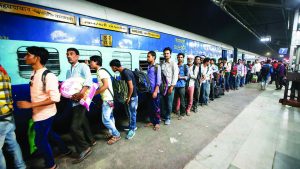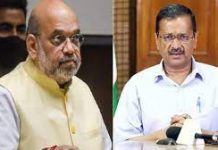 The incidents of attack on migrant workers from Uttar Pradesh, Bihar, Rajasthan, Madhya Pradesh and Hindi speaking belt have subsided in Gujarat, but the streak of violence that continued for nearly a week and spread across eight districts including major cities like Ahmedabad, Surat, Rajkot and Morbi, has exposed the underbelly of Gujarat’s politics ahead of the 2019 general elections. The politics of hate, be it against minorities, Dalits or migrants, is likely to remain the undercurrent in run up to the Lok Sabha polls in the western state.
The incidents of attack on migrant workers from Uttar Pradesh, Bihar, Rajasthan, Madhya Pradesh and Hindi speaking belt have subsided in Gujarat, but the streak of violence that continued for nearly a week and spread across eight districts including major cities like Ahmedabad, Surat, Rajkot and Morbi, has exposed the underbelly of Gujarat’s politics ahead of the 2019 general elections. The politics of hate, be it against minorities, Dalits or migrants, is likely to remain the undercurrent in run up to the Lok Sabha polls in the western state.
Being an industrial state, Gujarat has always welcomed migrant labour force from UP, Bihar, MP and other states. These migrants form a majority of the work force in the industrial units — be it the textile and chemical industries of Surat and Ahmedabad or small spare parts making factories of north Gujarat.
Assistant professor at Indian Institute of Management, Ahmedabad (IIM-A) Chinmay Tumbe, says that migrants make up about 70 per cent of workforce in Surat and nearly 50 per cent in Ahmedabad, higher than most of the major cities of the country. He explains that while the numbers were less for other cities of Gujarat the number but it was still substantial. Tumbe has documented the migrant workforce in his book India Moving: The History of Migration that was published earlier this year. “Historically there have been less anti-migrant riots or violence in Punjab and Gujarat as people of these states themselves are known to be migrating across the globe in large numbers,” he said.
So, what triggered the violence against migrants in Gujarat? The ignition point was rape of a 14-month-old toddler from a village near Himmatnagar in Sabarkantha district of North Gujarat on September 28. The accused, a migrant worker from Bihar, was arrested on the same day. But the politics played over the incident — first by Thakor community (the girl also belongs to the same community) leader and Congress MLA Alpesh Thakor and then by the ruling BJP government in blaming the opposition for inciting the locals against the migrants, added fuel to the fire.
On September 29, a day after the unfortunate incident, Alpesh Thakor went live on Facebook, saying that a migrant was responsible for the inhumane act. Thakor went on to say that had the accused been handed over the ‘Thakor Sena’ a community outfit he heads, justice would have been done then and there itself.
This is what the BJP claimed had incited the violence against the migrants in north Gujarat districts of Sabarkantha, Patan, Banaskantha, Mehsana which later spread to Ahmedabad, Vadodara, Surat, Morbi and Rajkot cities.
At least 500 people have been arrested, most of them from the Thakor community, for rioting and violence against migrants and over 50 cases have been registered across the state. Of the 500 arrested 150 are behind bars for spread rumours about attacks on migrant workers.
How the politics played
Though soon after Alpesh’s statement there were no attacks or violence. But after October 2, attacks on migrant workers began in some north Gujarat towns and spread to other cities. And in panic number of workers started fleeing from Gujarat to their hometowns fearing attacks.
On one hand, the BJP government in Gujarat blamed Alpesh’s inciting and rumours spread using social media for spreading panic among the migrants, the Congress demanded resignation of chief minister Vijay Rupani for failing to protect the migrant workers. Congress President Rahul Gandhi tweeted: “There is nothing more frightening than poverty. The root cause of the violence in Gujarat is the closed down factories and unemployment there. Both the system and that economy are reeling. Making migrant labour their target is completely wrong. I stand totally against it.”
Gujarat CM Rupani in a series of tweets accused the Congress of inciting the violence. “Congress first incites violence against migrants. Congress president tweets to condemn this violence. Does the Congress president not have any shame? If the Congress president is against the violence in Gujarat, he needs to take action against its own members who incited violence against the migrants in Gujarat… We are working hard to ensure trust & confidence among all citizens that they are safe & secure in Gujarat, instead of indulging in blame game….”
The allegations of inciting violence backfired on Alpesh, who later condemned the violence and accused the BJP of making baseless allegation to save the embarrassment. Alpesh also faced opposition from his own party members leaving him alone to defend himself and his earlier statement. His token fast over the issue on October 11 witnessed a thin attendance. Alpesh also softened his stance and demanded that 85 per cent employment should go to locals.
Later Rupani had to assure safety of migrant workers and promise appropriate action against those involved in attacks after the Uttar Pradesh CM Yogi Aditya Nath and Bhiar CM Nitish Kumar raised concern over the issue. “Gujarat has always accepted people of various states as their own. This has been the culture of Gujarat since ages. I appeal to the people of Gujarat to maintain atmosphere of peace and harmony in the state. Those guilty of violence and attacks on migrant labourers have been arrested and strict action will be taken against them,” Rupani tweeted.
Impact on industries
Caught on the wrong foot, the state government pushed its entire machinery to control the situation which had annoyed their top brass in Delhi. As a result, collectors, Sps and other district administrators were seen reaching out to migrants waiting for trains at railway stations, bus stations or having pani puri with the friendly Bhayaji on the streets. This drill, to some extent did the damage control. But the industries were already facing the heat of the exodus of labourers.
According to industry estimates, some 12,000 migrant labourers hailing from Hindi-speaking states including Uttar Pradesh, Bihar and Madhya Pradesh — employed in manufacturing units in north Gujarat region — had fled to their home states. The panic also spared to industrial clusters in Morbi, Jamanagar, Surat and Kutch, which employ a large number of workers from outside the state. Industry experts say Gujarat has over 1 crore industrial workers and 70 per cent of them are non-Gujarati, mainly from the Hindis peaking belt. Absence of workers has adversely impacted overall industrial activity and dented production, say stakeholders. Ajit Shah, president, Sanand Industries Association (SIA) said that their industrial region was among those worst hit by the labour exodus. SIA members claim that some 4,000 workers have migrated to their home states from Sanand, in the past 3-4 days.
“Some 4,000 migrant workers have fled Sanand over the past week, due to an atmosphere of fear created by rumours circulated on social media,” Shah said. “About 60 per cent workforce in the Sanand Industrial Estate comprises migrant workers.” He added that the exodus of migrant workers from has dented production by 25 per cent. “Absence of labourers is impacting industrial activity, especially in small- and medium-scale industries which do not have automation to a great extent and are therefore, dependent on labourers. The unrest is denting the industrial production by an estimated 25 per cent overall.”
The situation was the same in Mehsana, Kadi, Kalol and Himmatnagar, where workers employed in ceramics, plastics, textiles and engineering industries have started leaving too. “Of the 3,000 workers employed at 285 units in Mehsana industrial estate, 400 are Hindi-speaking and 150 of them have already left fearing violence,” said Chirag Patel, secretary, Mehsana Industries Association. He said that the production was hit by 15 per cent-20 per cent ahead of peak Diwali season. Ceramic units in Himmatnagar, too, have seen dip in production.
Last week, the Gujarat State Human Rights Commission too issued to the state government and the director general of police seeking reports on the attacks and exodus of Hindi-speaking migrant workers. The reports has to be submitted to chairperson of the Gujarat State Human Rights Commission Justice (retired) Abhilasha Kumari. The Gujarat High Court also took note of the violent incidents and asked the state government to submit report in court.
letters@tehelka.com












